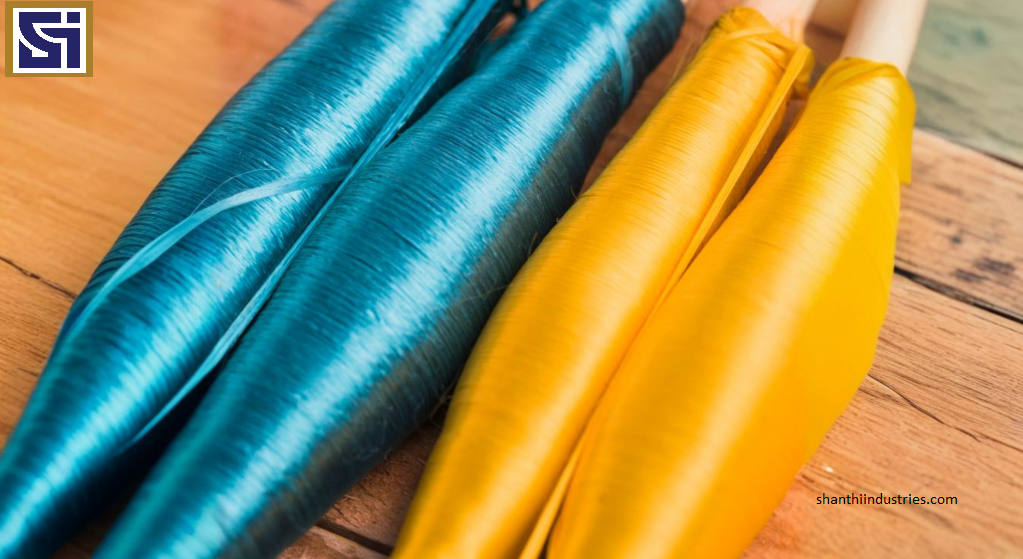At Shanthi Industries, we specialise in the manufacture of high-quality Polyester Monofilament Yarn and Nylon Monofilament Yarn, engineered for demanding applications across textiles, technical fabrics, filtration, and industrial uses. Our advanced extrusion, drawing and finishing technologies enable us to deliver yarns with superior strength, dimensional stability and consistent performance.
What is Monofilament Yarn?
Monofilament yarns consist of a single continuous filament as the yarn. Unlike multifilament yarns made of many fine fibres twisted together, monofilaments are extruded and drawn to a precise diameter and then wound—resulting in a yarn with uniform cross-section, smooth surface and excellent structural integrity.
Such yarns are ideally suited for applications needing:
• High tensile strength and abrasion resistance,
• Excellent uniformity and durability,
• Low elongation and dimensional stability under tension.
At Shanthi Industries, we offer monofilament options in materials such as PET (polyester), PA (nylon), PP (polypropylene) and PE (polyethylene) to meet diverse customer requirements.
Polyester Monofilament Yarn
Our Polyester Monofilament Yarn (typically PET based) is manufactured using imported German-technology extrusion equipment and advanced proprietary processes. Key attributes include:
• High tensile strength for demanding loads,
• Excellent uniformity in diameter and fineness for precision applications,
• Customisable options in colour, fineness and physical properties,
• Packaging flexibility (straight tubes, spools) for ease of handling.
Typical applications:
• Braided sleeving and narrow fabrics,
• 3D spacer fabrics and technical mesh,
• Screen-printing mesh and filter cloth,
• Conveyor belts and high-end curtain tapes.
Moreover, polyester’s excellent chemical stability and moisture resistance make it a strong choice for industrial environments.
Nylon Monofilament Yarn
Our Nylon Monofilament Yarn is crafted from premium nylon (e.g., PA6, PA66) chips sourced from Germany/Netherlands and processed to deliver superior durability and performance. Key features include:
• Exceptional tensile strength and abrasion resistance for tough conditions,
• Availability of specialised variants: anti-UV, acid and alkali-resistant nylon types,
• Excellent temperature and chemical stability (especially with nylon-6.6 variants).
Major application fields:
• Braided sleeves and hook-and-loop fasteners,
• Screen-printing meshes, high-precision filter cloths, lace webbing,
• Industrial nets, seat-belting, safety fabrics, and more.
Choosing nylon monofilament is especially advantageous where flexibility combined with strength and wear-resistance is essential.
Why Choose Shanthi Industries’ Monofilament Yarns?
• Cutting-edge manufacturing: State-of-the-art extrusion, drawing & heat-setting ensure yarns meet tight tolerances.
• Material versatility: From polyester to nylon (and PP/PE) we cater across the spectrum of performance and budget.
• Customisation: We tailor diameter (0.005 mm-1.00 mm), fineness, colour, and physical properties to your specification.
• Industrial trust: Proven in filter cloths, narrow fabrics, 3D spacer textiles and other high-tech uses.
• Support & service: We help you select the right monofilament – polyester or nylon – based on your end-use, environment and performance expectations.
How to Select Between Polyester vs Nylon Monofilament Yarn
Here are some key considerations to guide your selection:
• Service environment: If exposure to chemicals, UV or high abrasion is expected, nylon may offer edge; polyester may suffice for less aggressive conditions.
• Elongation & bounce-back: Nylon typically offers better elasticity and recovery; polyester gives more dimensional stability.
• Cost & availability: Polyester monofilaments often cost less and are easier to dye or process; nylon may command premium depending on specification.
• Finish and hand-feel: For applications like narrow fabrics or decorative webbing, surface smoothness, colour-uniformity and finish may tilt choice.
• Durability requirements: For heavy-duty industrial uses (e.g., heavy mesh, filter belts, conveyor components) the higher strength nylon variants may be preferred.
Our team at Shanthi Industries can assist in specification—whether you need a 20 dtex filament for webbings or 1000 dtex coarse yarn for industrial belt manufacturing.
Conclusion
In sum, whether your requirement is for high-end Polyester Monofilament Yarn or heavy-duty Nylon Monofilament Yarn, Shanthi Industries delivers world-class quality, consistency and tailored solutions to match your project needs. We invite you to explore our monofilament range and let us partner in realising your next textile or technical fibre application with confidence.





Comments